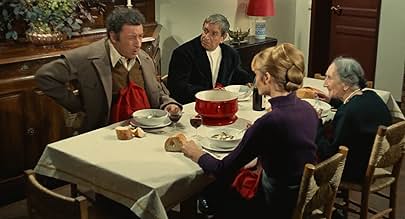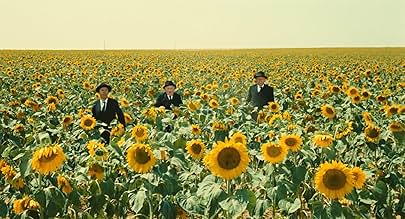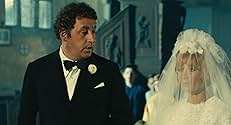IMDb RATING
7.3/10
2.4K
YOUR RATING
Alexandre, a young and honest farmer under the yoke of an authoritarian wife, works around the clock in the fields. When she dies in a car accident, it's a holiday for Alexandre.Alexandre, a young and honest farmer under the yoke of an authoritarian wife, works around the clock in the fields. When she dies in a car accident, it's a holiday for Alexandre.Alexandre, a young and honest farmer under the yoke of an authoritarian wife, works around the clock in the fields. When she dies in a car accident, it's a holiday for Alexandre.
Featured reviews
This is a strangely great film. It is a comedy with many moments of uncontrollable hilarity. But what is special about it is that it haunts you long after you have seen it. The images sit vividly in your mind. The themes are built with great cleverness yet extremely subtly and entertainingly. This is a film of intelligence. It is superficially about the eternal war between men and women. But that is just the familiar context and not the real subject. It is really about small town customs and mores and how being different is a problem. It also has an extremely clever cyclical theme. This film ran continuously in Boston for years. (You can look it up.) It is not to be missed if at all possible. Anyone know how I can get a copy?
Yves Robert passed away three years ago and any cine buff remembers him for his towering achievements that are: "la Guerre des Boutons" (1962), an adaptation of Louis Pergaud's famous novel still fresh today as it was forty three years ago, "my Father's Glory" and "my Mother's Castle" (1990), adaptations of Marcel Pagnol's childhood memories. And don't forget a good pack of quality comedies treated with respect and no vulgarity. This flick, "Alexandre le Bienheureux" (1967) largely deserves its place of winner among them.
In 1880, Paul Laforgue wrote and published an essay entitled: "le Droit à la Paresse" (the Right to Laziness) in which he offered a positive definition about this term generally considered as one of the biggest vices in the world. But Laforgue shelved the negative prejudices about it. He suggested to leave work fallow and to devote free time to rest and leisure which enabled a beneficial development for the individual. I suppose Yves Robert did the same for his movie. Without taking itself too seriously, it presents itself as a comical tale in which laziness is praised because thanks to it, happiness and the possibility to enjoy basic pleasures of life prevail. There's no need to worry about the constraints and stress imposed by work and modern society. And in the background, there's this country filmed with love and delicacy which Robert seems to know like the back of his hand.
Seen today, the movie displays a few technical flaws that weren't noticeable in 1967. Certain shots or camera movements are dated and it lets us think that the movie on a technical level hasn't worn well. But it has no importance for it kept an undeniable charm and can be watched with pleasure again. And a few funny moments in Robert's work evoke the devastating humor coming from Tex Avery's cartoons like the orchestra in front of Alexandre's house.
Philippe Noiret in the main role acts the role of Alexandre with an admirable easiness and naturalness. Because of its physical appearance and as he is inseparable from his dog Kaly, he is akin to Obélix with his tiny dog Idéfix. The rest of the cast follows him well and includes Pierre Richard and Jean Carmet.
At the level of the quality in Robert's filmography, "Alexandre le Bienheureux" is just a few notches below Robert's flicks I previously mentioned. It's the kind of movie to full savor after a hard day's work or after a Jean Luc Godard intellectual movie. Given that it is difficult to find in DVD, it deserves to be restored in favor and considering all the favors did by Kaly to his master, Robert's movie perfectly illustrates the famous maxim: "man's best friend is the dog".
In 1880, Paul Laforgue wrote and published an essay entitled: "le Droit à la Paresse" (the Right to Laziness) in which he offered a positive definition about this term generally considered as one of the biggest vices in the world. But Laforgue shelved the negative prejudices about it. He suggested to leave work fallow and to devote free time to rest and leisure which enabled a beneficial development for the individual. I suppose Yves Robert did the same for his movie. Without taking itself too seriously, it presents itself as a comical tale in which laziness is praised because thanks to it, happiness and the possibility to enjoy basic pleasures of life prevail. There's no need to worry about the constraints and stress imposed by work and modern society. And in the background, there's this country filmed with love and delicacy which Robert seems to know like the back of his hand.
Seen today, the movie displays a few technical flaws that weren't noticeable in 1967. Certain shots or camera movements are dated and it lets us think that the movie on a technical level hasn't worn well. But it has no importance for it kept an undeniable charm and can be watched with pleasure again. And a few funny moments in Robert's work evoke the devastating humor coming from Tex Avery's cartoons like the orchestra in front of Alexandre's house.
Philippe Noiret in the main role acts the role of Alexandre with an admirable easiness and naturalness. Because of its physical appearance and as he is inseparable from his dog Kaly, he is akin to Obélix with his tiny dog Idéfix. The rest of the cast follows him well and includes Pierre Richard and Jean Carmet.
At the level of the quality in Robert's filmography, "Alexandre le Bienheureux" is just a few notches below Robert's flicks I previously mentioned. It's the kind of movie to full savor after a hard day's work or after a Jean Luc Godard intellectual movie. Given that it is difficult to find in DVD, it deserves to be restored in favor and considering all the favors did by Kaly to his master, Robert's movie perfectly illustrates the famous maxim: "man's best friend is the dog".
Every once in a while a movie sneaks up on you and just really flat out surprises you. For me, this was one of those movies. The french sure have a way with wit and comedy. They were masters at it. This one is at the top of the pile for sure. I guess you can't go back again but if you could, I would request more french comedies just like this one.
My day got a whole lot better watching this. This one is classified as a comedy and rightly so, but ,there needs to be another category for movies like this...Charming. If your not smiling or happy or not feeling better after watching this, you need therapy. They don't make em like this anymore. Absolutely fantastic film.
My day got a whole lot better watching this. This one is classified as a comedy and rightly so, but ,there needs to be another category for movies like this...Charming. If your not smiling or happy or not feeling better after watching this, you need therapy. They don't make em like this anymore. Absolutely fantastic film.
It was in 1968 that famous French actor/director Yves Robert shot "Alexandre Le Bienheureux"/Very Happy Alexander. It is said about Yves Robert that before entering the field of cinema, he had successfully tried his hand at various "Métiers" which have enabled him to faithfully depict working classes in his films. It is precisely his eye for detail which is very much visible in this film. A very happy Alexander is one of his lesser known comedy films which celebrates the virtues of laziness. It is true that laziness has been known since olden times as one of the seven deadly sins. However, Yves Robert makes us believe that even a certain joy can be had if one is able to lead a planned lazy life without bothering to worry about what is happening in the outside world. As a "meaningful" comedy film, 'Alexandre Le Bienheureux' raises a lot of pertinent questions about male/female relationships especially in the context of love and marriage. One of the most important questions raised by this film is whether a partner can leave a union if the relationship is purely based on money. Much of the film concerns a happy farmer Alexander whose life changes for good when his domineering rich wife dies in a car accident. The film also discusses how love can change a person's life. This aspect is depicted through a credible amorous relationship featuring two great actors of French cinema: Philippe Noiret and Marlène Jobert.
In an era that also gave us Peter Seller's Clouseau, Phillipe Noiret created another indelible comic character in Alexandre that deserves a certain degree of immortality. One can only hope that there is a vault somewhere that contains a decent print of the film and that the owners will see fit to preserve it. To describe "Alexandre le bienheureux" as charming is too soft a description -- it is social and political commentary wrapped in a delightful and hilarious package that has few equals. The ending was a revelation for a generation of young filmgoers who also believed there might be something more to life than laboring to gain subsistence. When it played in my hometown in the early 1970's -- in a limited run at the local art museum -- I dragged everyone I could find to it. Ah, to be able to do the same today!
Did you know
- ConnectionsFeatured in Le bal des casse-pieds (1992)
- SoundtracksLe Ciel, la Terre et l'Eau
Music by Vladimir Cosma
Lyrics by Francis Lemarque
Performed by Isabelle Aubret
- How long is Very Happy Alexander?Powered by Alexa
Details
- Release date
- Country of origin
- Official site
- Language
- Also known as
- Alexander
- Filming locations
- Production companies
- See more company credits at IMDbPro
- Runtime
- 1h 40m(100 min)
- Sound mix
- Aspect ratio
- 1.85 : 1
Contribute to this page
Suggest an edit or add missing content

































